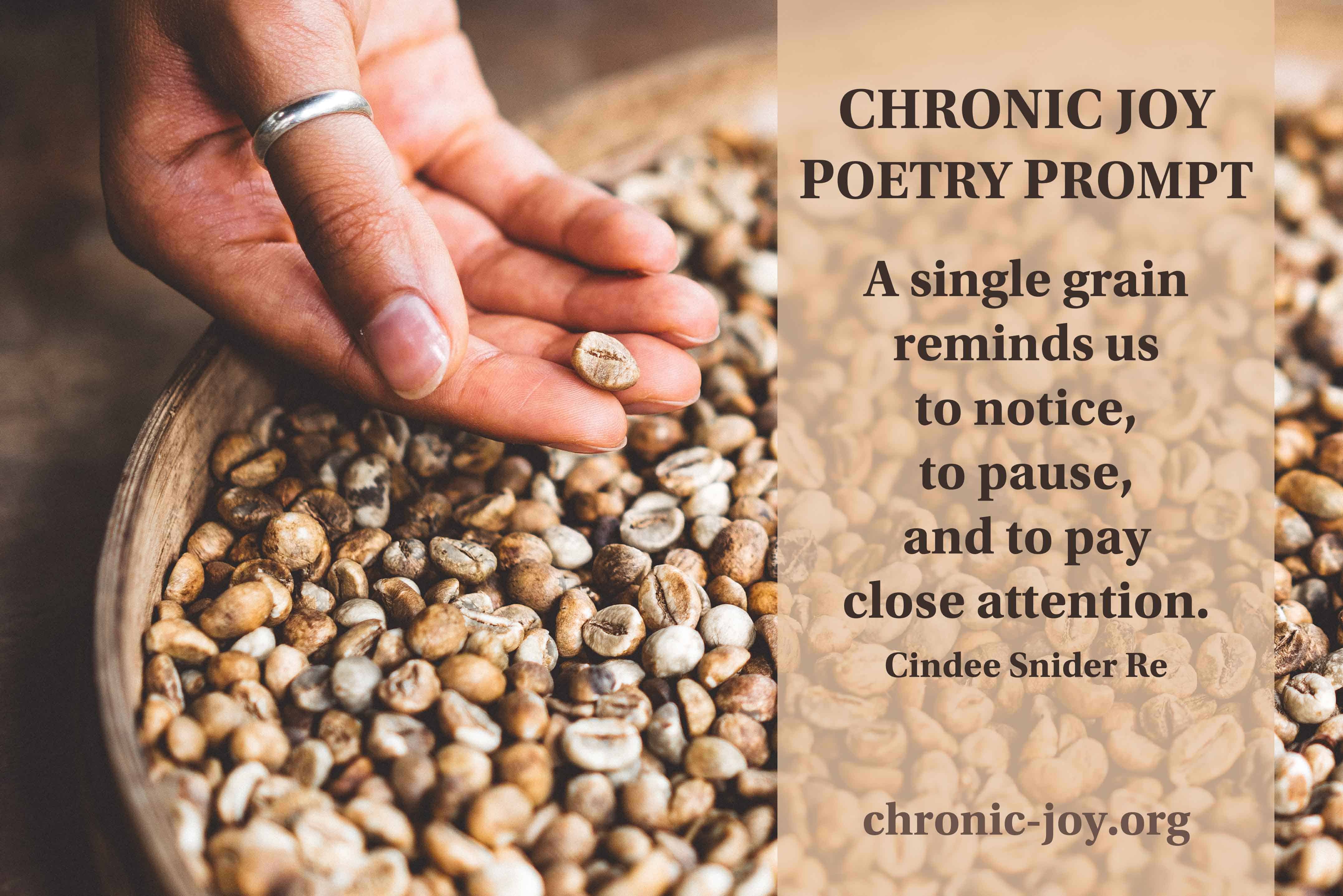GRATITUDE AND HARVEST
Gratitude can sometimes feel elusive in the midst of chronic pain and illness. Yet whether shrouded in fog or buried by loss, forgotten in a dusty corner or almost imperceptible through our tears, gratitude is firmly woven into the fabric of our souls – and in God’s timing, it will produce a harvest of maturity.
Even when we are overwhelmed.
Even when we cannot speak the word.
Yes, even when our circumstances feel endless and impossible, even in the midst of chaos, and even when we shut our eyes against a sliver of sunlight on a long and colorless day.
Gratitude, intentionally spoken, plants the seeds that in God’s perfect timing will emerge from our long dark seasons into spring’s lengthening light, growing strong in summer’s heat, and finally, ripening into an abundant harvest of maturity – the fruit of the Spirit: love, joy, peace, patience, kindness, goodness, faithfulness, gentleness, and self-control.
FROM GRATITUDE TO HARVEST • HOW TO BEGIN
Intentional gratitude starts by noticing grains of grace – by thanking God for:
- junk mail instead of one more bill to pay today
- a shaft of sunlight dancing in the leaves
- the warmth of a fresh cup of tea
- the smell of clean laundry
- love carried on an unexpected memory
NOTICE DETAILS – THE SMALL GRAINS LEAD TO GRATITUDE
Edward King (1829-1910), Bishop of Lincoln, wrote this about gratitude:
I will thank God for the pleasures given me through my senses, for the glory of the thunder, for the mystery of music, the singing of birds and the laughter of children. I will thank God for the pleasures of seeing, for the delights through colour, for the awe of the sunset, the beauty of flowers, the smile of friendship, and the look of love; for the changing beauty of the clouds, for the wild roses in the hedges, for the form and beauty of birds, for the leaves on the trees in spring and autumn, for the witness of the leafless trees through the winter, teaching us that death is sleep and not destruction, for the sweetness of flowers and the scent of hay. Truly, oh Lord, the earth is full of Thy riches!
In The Sound of Music, Julie Andrews sings about a few of her favorite ordinary, everyday things:
- raindrops on roses
- whiskers on kittens
- bright copper kettles
- warm woolen mittens
- cream-colored ponies
- crisp apple strudels
- schnitzel with noodles
Both Edward King’s quote and the lyrics sung by Julie Andrews are about noticing details. About paying attention to the grains of grace right where you are.
In the book Acceptable Words: Prayers for the Writer, Gary D. Schmidt and Elizabeth Stickney write:
The writer is aware of the miracle of a maple tree bark, even though she may be in a forest of maple trees. The writer is aware of the cracks in this one sidewalk he walks on, even though he is walking in a city of sidewalks. The writer is aware of the smell of salty pretzels, the beat of the sun at the high altitudes, the lonely cry of a train whistle across cornfields …
Noticing gives us gratitude footholds for dark days. Those footholds of gratitude lead to a harvest.
Robert Louis Stevenson said it like this:
And now, when the clouds gather and the rain impends over the forest and our house, permit us not to be cast down; let us not lose the savour of past mercies and past pleasures; but, like the voice of a bird singing in the rain, let grateful memory survive in the hour of darkness.
WHY THE TITLE A HARVEST OF GRAINS?
From a distance, a field of grain moves as a single undulating wave under the autumn sun. There is beauty is a golden sea of grain. Yet it is a single grain, like a single moment, that begins to nourish and sustain.
A single grain reminds us to pause and pay attention, to notice a sip, a bite, a touch, a breath, a petal, a creak, a snap, a hum.
A field reminds us to gaze out across the horizon: to let our eyes survey the ocean, blue as far as the eye can see, or to tip our heads back in wonder at the vast and endless night sky.
Both give form and rhythm to our days. Both draw us deeper into Jesus. Both nourish and sustain.
Intentional gratitude invites us to notice and thank God for grace upon grace upon amazing grace. This gratitude leads to a beautiful harvest.
NOW IT’S YOUR TURN – NOTICE DETAILS
Set aside a few minutes today to simply notice the details around you:
- sunlight through a window
- the smell of rain-washed earth
- the nuzzle of a puppy
- an interesting shadow
- the laughter of a child
- the scent of an orange as it’s peeled
- cool water flowing from the tap
- the familiar creak of a floorboard
- the sigh of wind in the pines
PAY ATTENTION. NOTICE THE DETAILS. COLLECT THE MOMENTS
Collect the moments and string them together.
Play with line breaks and the rhythm of words. Let them dance, sing, move, and breathe.
When you’re ready, write.
You just might find that the small moments of gratitude lead to a harvest of grains.
A POEM TO GET YOU STARTED
I wrote the following poem after several years of collecting moments in a notebook, of watching, listening, and noticing details. Because of the sandhill crane’s migratory patterns, it seemed somehow fitting to include the poem in this prompt.
CANTICLE OF THE CRANES
They arrive with the first breath of spring,
still weeks off, as if it trails behind them,
pulled north along their migratory routes.
Do they sense it on the horizon?
Do they taste it in the tender tuber shoots?
Or is this annual convergence of half
a million cranes along the Platte River,
a date imprinted on their DNA,
a primal tug to pull up stakes and log
nearly 500 miles a day en route to their summer
nesting grounds? They must be exhausted,
this mating pair who soak up the afternoon sun.
But the sedge is here now, soon to prepare
last year’s mound for this year’s chicks. But first …
they dance! Pumping crimson-capped heads,
leaping, stretching their wings, tossing small sticks
to the wind, and inviting life-long mates to copulate.
I wonder if they miss their days in the bachelor flock?
Or if they’re content now to raise their yearly doublet of colts,
these young who are impatient to run, who strike out
from the nest in less than a day – easy prey for
a sharp-eyed owl or a scavenging coon. How soon
are they taught to beware of their predators?
Am I predator too? Lying in wait – not to band
or clip or eat – but to capture them in pixels –
sleeping, flamingo-style, in an icy bog, or a hen with
her chicks, or stirring the soul with their rolling, rattling
song rising from throats shaped like a brass trombone?
How many springs will these cranes return?
Will their unison duet outlast my own?


Cindee Snider Re
Author, Photographer, and Co-Founder at Chronic Joy®
Cindee is wife of the man she loves most in this world, mama of five world-shaking creatives (19-27), author of Discovering Hope, Finding Purpose, Embracing Worth and I Take You in Sickness and in Health, photographer, craver of quiet, lover of cotton, denim, Jesus and tea, and co-founder of Chronic Joy®. Cindee and four of her five kids have Ehlers-Danlos, dysautonomia, intractable migraine, and myriad co-existing conditions through which they’re learning the deeper the valley, the greater their capacity for joy.

I Will Give Thanks
Gratitude is a gift given to us by God. At its core, gratitude is about not taking anything for granted. Living a life of gratitude is about learning to draw near to God, being thankful for what we have, for who God is, and for who He created us to be.


Recent Comments